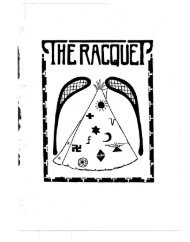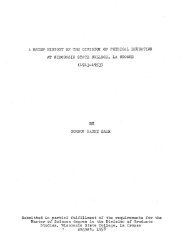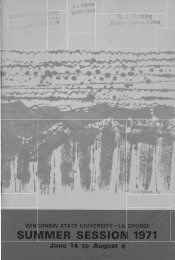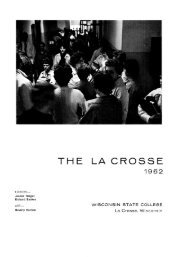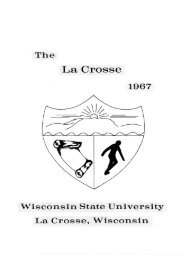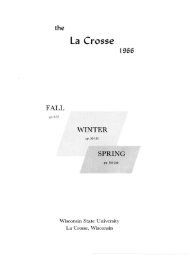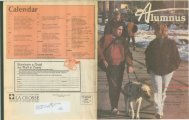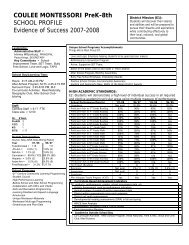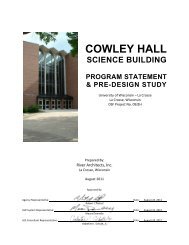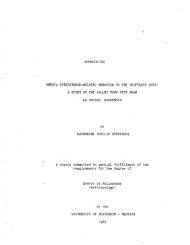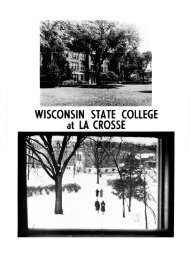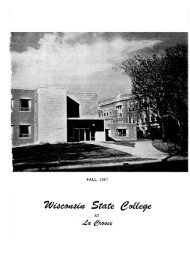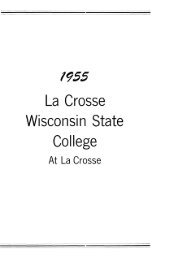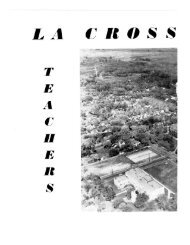Successful recreation is much more than simply enjoying the sunset ...
Successful recreation is much more than simply enjoying the sunset ...
Successful recreation is much more than simply enjoying the sunset ...
You also want an ePaper? Increase the reach of your titles
YUMPU automatically turns print PDFs into web optimized ePapers that Google loves.
A brief h<strong>is</strong>tory<br />
of <strong>the</strong> department<br />
UW-L has offered <strong>recreation</strong>-related<br />
degrees for <strong>more</strong> <strong>than</strong> 50 years.<br />
Therapeutic <strong>recreation</strong> programming began<br />
in 1973.<br />
1945 — A double major in <strong>recreation</strong> and physical<br />
education was first offered within <strong>the</strong> physical education<br />
department.<br />
1950 — Alice De Bower, one of <strong>the</strong> first <strong>recreation</strong><br />
faculty members, establ<strong>is</strong>hed <strong>the</strong> Recreation Majors Club.<br />
1960 — Degree program in <strong>recreation</strong> developed; it<br />
included concentrations in <strong>recreation</strong> program<br />
leadership, and <strong>recreation</strong> and park admin<strong>is</strong>tration.<br />
1967 — The <strong>recreation</strong> and parks department formed<br />
with nearly 100 full-time students.<br />
1972 — Therapeutic <strong>recreation</strong> program initiated with a<br />
proposal submitted to <strong>the</strong> university by William Otto,<br />
chair of <strong>the</strong> department.<br />
1973 — Shirley Bushell hired as <strong>the</strong> first <strong>the</strong>rapeutic<br />
<strong>recreation</strong> instructor.<br />
1974 — Therapeutic <strong>recreation</strong> becomes <strong>the</strong> third<br />
concentration of <strong>the</strong> <strong>recreation</strong> and parks major.<br />
1988 — Department of Recreation and Parks receives<br />
its first accreditation by <strong>the</strong> National Council on<br />
Accreditation (NCA) of <strong>the</strong> NRPA/AALR with three<br />
concentration areas: <strong>the</strong>rapeutic <strong>recreation</strong>, <strong>recreation</strong><br />
and park admin<strong>is</strong>tration, and <strong>recreation</strong> program<br />
leadership.<br />
1989 — Therapeutic <strong>recreation</strong> major approved by <strong>the</strong><br />
UW System.<br />
1991 — Department’s new name <strong>is</strong> <strong>the</strong> department of<br />
<strong>recreation</strong> management and <strong>the</strong>rapeutic <strong>recreation</strong>.<br />
1993 — Department of <strong>recreation</strong> management and<br />
<strong>the</strong>rapeutic <strong>recreation</strong> receives a second five-year<br />
national accreditation by <strong>the</strong> National Council on<br />
Accreditation of <strong>the</strong> NRPA/AALR in two majors:<br />
<strong>recreation</strong> management and <strong>the</strong>rapeutic <strong>recreation</strong>.<br />
1998 — Re-accreditation of programs approved for<br />
five years by <strong>the</strong> NCA of <strong>the</strong> NRPA/AALR.<br />
2003 — Department reaccredited by <strong>the</strong> NCA of <strong>the</strong><br />
NRPA/AALR. Enrollment <strong>is</strong> 277 undergraduates and 25<br />
graduate students.<br />
The department’s philosophy<br />
“The department of <strong>recreation</strong> management and<br />
<strong>the</strong>rapeutic <strong>recreation</strong> strives to provide quality learning<br />
experiences which will enhance students’ ability to<br />
contribute to <strong>the</strong> le<strong>is</strong>ure development of individuals<br />
within <strong>the</strong> community and <strong>the</strong> agency in which <strong>the</strong>y will<br />
assume professional responsibilities.”<br />
Cover Story<br />
Bill Carlson, ’69, left, establ<strong>is</strong>hed a fund-ra<strong>is</strong>ing challenge that<br />
has helped department chair George Arimond, right, and o<strong>the</strong>r<br />
faculty encourage o<strong>the</strong>rs to follow suit. Funds ra<strong>is</strong>ed have helped<br />
<strong>the</strong> department purchase state-of-<strong>the</strong>-art technology and<br />
equipment, as well as providing needed scholarships and grants<br />
to students.<br />
Challenge offers reward<br />
for department<br />
Bill Carlson offered a challenge to <strong>recreation</strong> management<br />
and <strong>the</strong>rapeutic <strong>recreation</strong> majors in 1996: donate to <strong>the</strong><br />
department and he would, too.<br />
The 1969 <strong>recreation</strong> management major challenged alumni<br />
to donate at least $5,000 as a group during an annual appeal,<br />
and he would match it. Carlson’s initial five-year pledge of<br />
$25,000 in matches was eventually extended an additional year<br />
for ano<strong>the</strong>r $5,000. Alumni responded and met, or surpassed,<br />
<strong>the</strong> challenge each of those years.<br />
“Challenges are <strong>the</strong> way to go in fund ra<strong>is</strong>ing,” notes Pat<br />
Stephens, director of collegiate gifts for <strong>the</strong> UW-L Foundation.<br />
“It’s a way for people to see <strong>the</strong>ir gifts doubling, so <strong>the</strong>y are<br />
<strong>more</strong> apt to give <strong>more</strong> <strong>than</strong> <strong>the</strong>y originally planned.”<br />
Carlson’s initial challenge sparked a succeeding fund-ra<strong>is</strong>er,<br />
too. A dozen alumni affiliated with <strong>the</strong> W<strong>is</strong>consin Parks and<br />
Recreation Association recently pledged $6,000 as a group over<br />
three years, and challenged o<strong>the</strong>rs who graduated from <strong>the</strong><br />
department to do <strong>the</strong> same. That challenge, too, <strong>is</strong> finding<br />
success.<br />
Money donated goes to an unrestricted fund for <strong>the</strong><br />
department. It <strong>is</strong> used for scholarships, reg<strong>is</strong>tration fees for<br />
students to attend conferences, <strong>recreation</strong> technology<br />
equipment, and research and faculty development.<br />
Stephens says <strong>the</strong> <strong>recreation</strong> management and <strong>the</strong>rapeutic<br />
<strong>recreation</strong> department’s fund-ra<strong>is</strong>ing challenge <strong>is</strong> unique on<br />
campus. “It remains a remarkable success,” he says.<br />
UW-La Crosse Alumnus/Winter 2003-04 5



